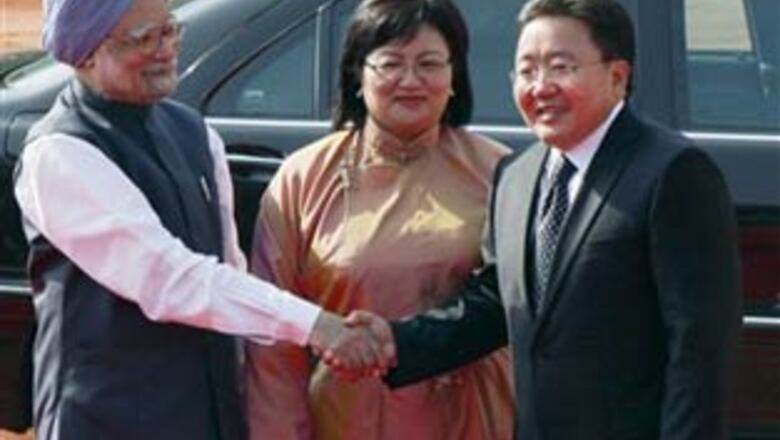
views
New Delhi: India on Monday signed a civil nuclear pact with Mongolia and announced a soft loan of $25 million to bolster the economy of the resource-rich Central Asian country that has been hit by global recession.
With this pact, Mongolia, a former satellite state of the Soviet Union, became the sixth country after the US, France, Russia and Kazakhstan and Namibia to sign a civil nuclear cooperation agreement with India.
India also inked four more agreements with Mongolia after talks between Prime Minister Manmohan Singh and Mongolian President Tsakhia Elbegdorj.
Describing the strategically located uranium-rich Mongolia as an important pillar of India's policy in the Asia-Pacific region, Manmohan Singh announced that the two countries have decided to upgrade their bilateral ties to comprehensive partnership.
The memorandum of agreement on 'development of cooperation in the field of peaceful uses of radioactive minerals and nuclear energy' was signed by senior officials in the department of atomic energy of the two countries.
Other agreements related to stabilisation loan assistance, health and medical science, cooperation in statistical matters and a cultural exchange programme for 2009-12.
Elbegdorj arrivedin the Capital on Sunday on a four-day visit.
The Mongolian president, along with his delegation comprising senior ministers and officials, will also visit Agra, Gaya and Mumbai.
Manmohan Singh also unveiled India's plan to set up an Information Technology Centre and offered assistance in human resource development and capacity building.
The two countries also decided to intensify their cooperation in combating terrorism and in pursuit of the UN reforms with Mongolia reiterating its "complete support" to India's candidature for permanent membership of the UN Security Council, a joint statement said.
Mongolia is on the brink of signing a major deal with mining giants Rio Tinto and Ivanhoe for the massive copper and gold deposits in the Gobi desert that is expected to generate $30 billion in tax revenue over 50 years.
If the deal comes through, it will have a major spin-off impact on Mongolia, one of the poorest countries bulging with huge deposits of copper, gold and uranium.
After decades of neglect, Mongolia, a country of 2.7 million people, is at the centre of a scramble for its huge resources with the US, Russia and China competing for a share of the pie.
Oyu Tolgoi, the biggest minerals deposit in the country, has the potential to produce more than 440,000 tonnes of copper and 330,000 ounces of gold a year on average for at least 35 years.














Comments
0 comment